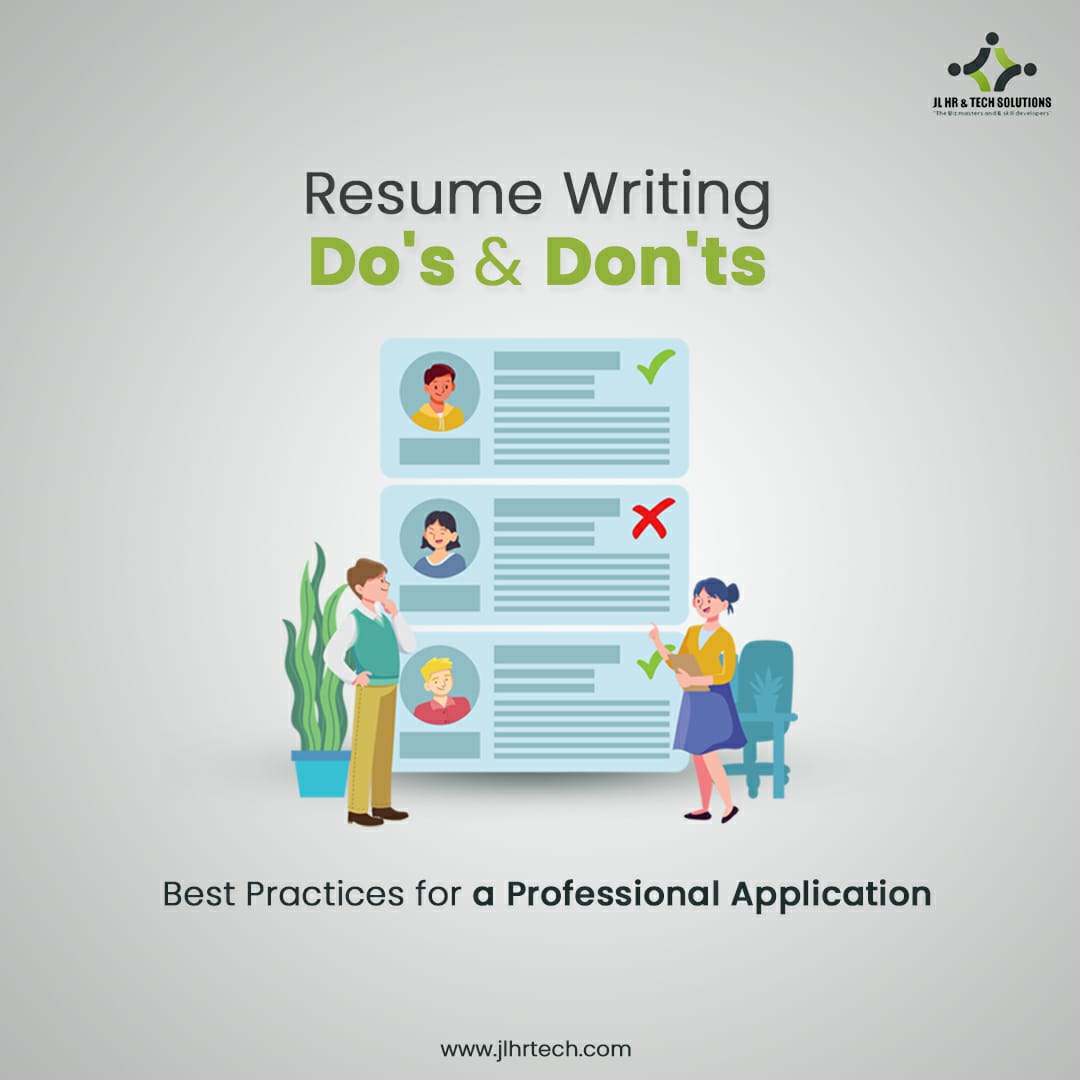1st Floor, SBC - 2, Thapasya, Infopark Campus, Kakkanad, Ernakulam, Kerala - 682042 hr@jlhrtech.com +91 9288 0033 83
A resume is a formal document that gives a brief overview of your professional background, including your relevant employment history, education, skills, and noteworthy accomplishments.
A professional resume is one of the most important components of the job search. Therefore, it's crucial to understand what makes a CV stand out. There are do's and don'ts of resume writing that helps you to create better CVs. Here, we go through essential resume must-haves and pitfalls to avoid.

The first guideline of resume writing is to make it brief and direct. Unless you have a very excellent reason for it to be longer, such as a lengthy career or a lot of very relevant job experience, the conventional guideline is no more than one page.
Include only current, relevant work experience on your CV for a simple method to keep it concise. Most people get confused about how to write work experience in resume. While your first job may have taught you a lot about valuable industry insights during your year-long tenure, it's not imperative to discuss every aspect of your entire professional history.
Too many unrelated work experiences on a CV might make it look overcrowded and distract from your key credentials. Your resume needs to be clear, concise and well-focused.
Using the same CV for every job you apply for is not a smart idea. Instead, you should tailor your resume to the particular position you're looking for. Prioritize your skills, qualifications, and experiences that are most relevant to the position you are applying for.
For example, if you are applying for a marketing role, you may emphasize the interpersonal, communication, and branding abilities you acquired while working in retail
If you don’t have a work history that exactly matches the position you're pursuing, get creative with how you present your other experiences. Draw on the skills you used and how your efforts and skills have benefited to your past projects or organizations.
By doing so, you can showcase your importance to potential employers that you possess the skills needed to succeed in the position.
List a few of your greatest professional accomplishments and one or two of your best abilities in one or two sentences. Your summary statement should be customized to the demands of the organization in order to stand out.
Always avoid misrepresenting yourself on your resume, despite the temptation to exaggerate the reality to make yourself seem more qualified for the position. By misrepresenting your abilities, you will deceive the employer, and if you are hired, it will become clear that you lied. Have faith in what you can provide!
Remember that managing the flood of resumes that recruiters get is one of the major obstacles in hiring. They won't have time to quickly glance at each résumé. They employ Application Tracking Systems (ATS) and even AI-assisted bots to streamline their job.
The resumes are scored by this algorithm after it scans each one for terms and phrases that correspond to those in the job description. Because of this, you should use as many relevant phrases as possible in your current resume to increase your score.
Grammatical mistakes and errors in punctuation give the hiring manager the impression that you are not detail-oriented and that you did not present your CV with adequate care. Prior to sending your CV to a prospective company, ask a friend or family member to proofread it. This one is considered a very important factor among the do's and don'ts of resume writing.
Instead of just describing general tasks, emphasise your prior experience by giving your work responsibilities a personal touch and giving particular instances. Make your CV unique!
Make sure your resume is simple yet professional-looking, regardless of the design, or colour scheme. You can use a writing tool to keep the resume's tone approachable yet professional.
The use of passive voice in a resume is not encouraged. Such lines are frequently uninteresting, which is the exact opposite of what you want for your resume.
A successful resume must have an easy layout that is attractive. Breaking the content into smaller pieces is the simplest approach to making a resume more visually attractive. For easier reading, break up paragraphs into bullet points.
Avoid including anything that is irrelevant to your job searches such as your age, weight, height marital status, political beliefs, or preferred religion.
Your resume should not exceed two pages. Although some jobs or sectors could need a lengthier, more detailed resume, most employers like one to two pages. You don't have to list every employment you've ever held on your resume to avoid unnecessarily building up it. Like learning soft skills to get an advantage in finding jobs, learning how to write a CV for job application is also a must have skill today.
These are some of the most advocated do's and don'ts of resume writing that might be considered while creating a professional CV. What are you waiting for right now? At JL HR and Tech, we can provide you with the skills to build a strong CV using the guidelines above and be ready for your upcoming interviews. Get in touch with us right now to know more